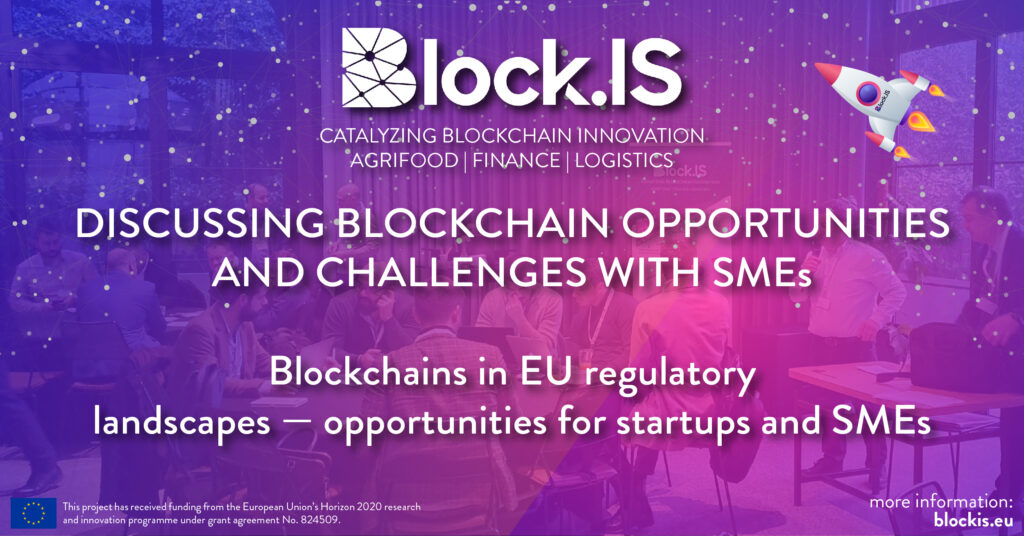
Block.IS was recently involved in a series of webinars in which challenges around policy and regulation around Blockchain were discussed. In one of the webinars the project organised and dubbed Blockchain Policy and Regulatory Challenges, Block.IS startups were specifically addressed by asking:
Given a (slow) shifting policy and regulatory landscape, how can businesses continue to innovate with Blockchain?
This series of two articles will discuss some of the issues that came up in the webinars and discussion points suggesting a way forward. In the second article, an open discussion regarding blockchain solution within different sectors is reported and some of the insights from a selection of the Block.IS startups are shared. In this first article, we will look at the regulatory landscape and the challenges it provides.
In the webinar, we introduced some of the key regulatory challenges around blockchain within various sectors and point towards developments from a policy perspective, with a focus on Europe. In order to better understand what kinds of regulatory challenges are out there, we need to look at Distributed Ledger Technologies (DLT) such as blockchain both conceptually and practically: what kinds of problems are they aiming to tackle and are they effective?
We can see that blockchain as an approach to ‘cut out the middle-man’ has made way for a focus on using blockchain for the creation of networks of immutable proofs. In these cases, the intention is to replace or resemble existing forms of tokenized proofs—such as money, identity papers, etc.—by a digital counterpart. Thus, digital and physical tokens are nothing new, but they are always linked to an agreed standard. DLTs offer proof of something through a different mechanism, yet with the same goal: to avoid tampering and proof, thus contributing to trust in a particular set and type of transactions.
The regulatory landscape that blockchains will face is a complicated one, and as with many innovations in ICT, touches both verticals and horizontals, meaning that block-chain based solutions will encounter both data regulation and sectorial regulation in which the solution is positioned. During the TNO-run webinar, we inquired about the awareness among startups of general regulation that affects blockchain solutions. Core challenges with regard to the GDPR were discussed, as were the legal status of smart contract. Some of the cornerstone-principles of the GDPR (such as data minimalization; right to data removal and alteration; and data anonymisation) are fundamentally contrary to the core principles of distributed ledger technologies (data needs to stay in the chain ‘forever’; it cannot be changed or altered; and it can never be entirely anonymous).
Another challenge for both policymakers and technology developers is the concept and status of a smart contract. Many in the field of legal-tech have argued that we need to rethink the paper-based agreement between parties for a digital era: smart contracts—expressed computationally and enforced computationally[1]—should solve the problem of the fact that online transactions happen so fast and potentially between such many different parties (and different type of parties, legally), that the paper-world can never keep up. In order to still guarantee some form of enforceable trust, legal terms and agreements could be ‘baked into’ the digital service and /or transaction, making such transactions verifiably, auditable, trustworthy.
Next to reflections on general regulation and the role of blockchain, sector-specific challenges were also discussed in regards to blockchain policy and regulation. The EC seems to direct its regulatory efforts regarding blockchain mainly at the financial sector. Existing regulation in this sector such as the Anti-Money Laundering (AML) and Know Your Customer (KYC) regulations can both act as drivers and barriers for ledger-based technologies. This is because they offer some solutions to challenges posed in these regulations, and also pose novel problems – blockchain-based cryptocurrencies have been used in money-laundering activities and it has proven difficult in many cases to connect a legal or natural person to blockchain owners or contributors, and unlike other financial assets they cannot be frozen by an authority suspecting criminal activity. Recently, the EC has proposed a new regulation to curb such issues, called MiCA: Markets in Crypto-Assets Regulation. MiCA is aimed at supporting innovation while protecting consumers and the integrity of cryptocurrency exchanges – and is basically a way for banks to hop on board the cryptocurrency bandwagon in a legitimate manner.
The issue, however, is, that the legal world does not let itself become obsolete so easily: there are many paper-world hurdles to take before smart contracts become a legally sound form of contract. Challenges smart contracts face are not only to be found in jurisdiction speed and expediency but more profoundly touch upon the core of legal thinking and reasoning, which is that laws, based in human language, should always be disputable and open to interpretation. This point is hard to reconcile with hardcoding contracts. On the other hand, if we look at the sectors where blockchain projects in Block.IS operate, we see that many processes regarding the transaction of goods or tokens have been semi-automated and standardised. Thus, it seems only logical that this trend continues in novel forms of automation that ensure networks of trust. In the second article, we will go into these Block.IS sectors, and which regulatory challenges they deal with.
[1] Wolfram, S. (2016). Computational Law, Symbolic Discourse and the AI Constitution—Stephen Wolfram Writings. [online] writings.stephenwolfram.com. Available here.
